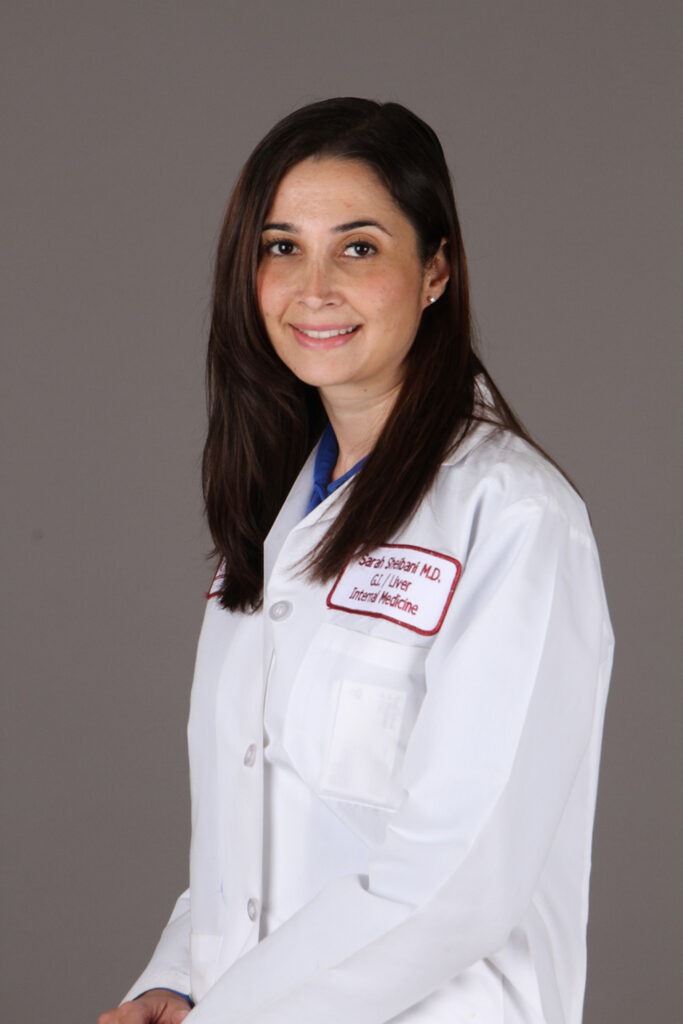
A Keck Medicine of USC gastroenterologist explains why more physicians are referring patients to tertiary centers for complex IBD cases.
When people think of inflammatory bowel diseases (IBD) like ulcerative colitis or Crohn’s disease, common symptoms like abdominal pain, constipation and diarrhea come to mind. Fewer realize, however, that IBD can be a very complex disease, requiring a high level of customized care.
When patients present with more severe disease, a multidisciplinary treatment approach may be needed, says Sarah Sheibani, MD, a gastroenterologist specializing in IBD. Sheibani co-leads the USC Inflammatory Bowel Disease Center, part of the USC Digestive Health Institute and Keck Medicine of USC.
Together, these specialists can optimize treatment and support the patient from all angles, Sheibani says. She outlines which medical providers might be part of a multifaceted IBD team.
Why can IBD be complex?
“IBD ranges from simple to very complex,” Sheibani explains. “It can span mild inflammation in the colon that causes minor symptoms like diarrhea or abdominal pain; or it can present with more severe inflammation that can lead to fistulization, where the bowel connects to other organs or other parts of the bowel; or it could lead to perforation, which is a hole in the colon or the small bowel.”
Adversity can extend beyond the bowel, not only to the esophagus and stomach but to other areas of a patient’s body. Sometimes, IBD symptoms can be so debilitating that patients can’t go to work or to school. It can also interfere with their relationships.
One of the frustrating facts about IBD is that it often manifests in young people and those of childbearing age. “It can affect their day-to-day during a time in their life when they are trying to finish school, get married or start a family. We treat many college students here at Keck Medicine,” Sheibani adds.

Because of this, she says, “You also have to think beyond the physical and address the psychosocial impacts of this disease, like anxiety and depression.”
Tertiary IBD care
This is the very reason why many physicians end up referring their IBD patients to a specialty digestive care center like the USC Inflammatory Bowel Disease Center. Their patients need this level of specialized, multidisciplinary care.
Sheibani says these patients often already have a diagnosis, and their physician needs help from specialists to treat the disease. “The majority of our patients are referrals from other gastroenterologists in the community seeking a second opinion or more support in providing the multidisciplinary type of care that some of these patients require,” Sheibani says.
Which IBD specialists might patients need?
At the USC Inflammatory Bowel Disease Center, the care team includes gastroenterologists, colorectal surgeons, pathologists, radiologists and nutritionists who specialize in treating IBD.
Academic medical centers are also likelier to be at the forefront of noninvasive diagnostic imaging, such as intestinal ultrasounds, to diagnose and stage IBD. “Here at Keck Medicine, we are starting an intestinal ultrasound program and will be able to restage disease in-clinic,” she adds.
If, when surgery is needed, “That’s where the expertise of our colorectal surgeons comes into play,” she says.
This disease often requires complex surgery. For this reason, she says, “You want to be referred to a center that has a lot of expertise in IBD surgery.” The co-leader of the USC Inflammatory Bowel Disease Center, Sang Lee, MD, chief of the USC Colorectal Surgery Program at Keck Medicine, and his colleagues specialize in performing these complex IBD surgeries, she says.
Not only that, but our surgeons are experts in laparoscopic procedures. With conditions like IBD, Sheibani says, “You want to do surgery in the most minimally invasive way possible to reduce hospital stay and long-term complications.”
The USC Inflammatory Bowel Disease Center also draws on the expertise of physicians knowledgeable about new medications to treat IBD. “We have access to clinical trials for patients who are not responding to available therapies. This may give patients an opportunity to try another medication before considering surgery.”
Specialties unite to treat IBD
Other specialists can also be integral in treating complex IBD cases. “Because IBD has a lot of extraintestinal manifestations that are not just GI-related, you need the support of other doctors besides surgeons,” Sheibani says.
Take dermatologists. “A lot of our dermatologists specialize in IBD-associated skin conditions that can be very challenging to treat,” Sheibani says. “If such a patient is referred to me with an IBD-related skin condition such as pyoderma gangrenosum, I’ll co-manage their case with one of our dermatologists.”
The same goes for rheumatologists when it comes to conditions such as IBD-associated arthritis. “I’ll refer the patient to one of our rheumatologists to help manage the joints, and we work together to find the right therapy,” she says.
Finally, other ancillary providers round out comprehensive care for IBD patients. Nutritionists with IBD expertise can guide patients who are malnourished, have vitamin deficiencies or are continuing to experience symptoms. And psychologists can help address the psychosocial impacts of this chronic, debilitating disease.
Sheibani notes that all the IBD specialists at the center learn from each other by discussing the most complex patient cases at multidisciplinary conferences every month.
Co-managing the patient
Sheibani emphasizes that in many circumstances, the USC Inflammatory Bowel Disease Center works together with a patient’s own physician to “co-manage” the patient’s disease.
“We can help address complex issues and relay them back to the primary GI,” she says. “We work with them and provide advice and guidance when needed. We always strive to keep the lines of communication open with the patient’s primary gastroenterologist.”
Topics
